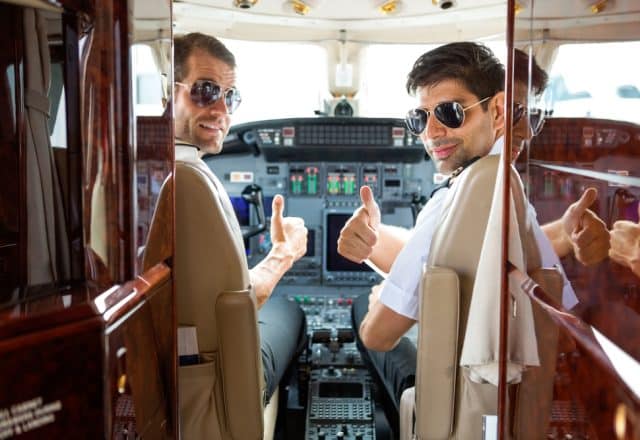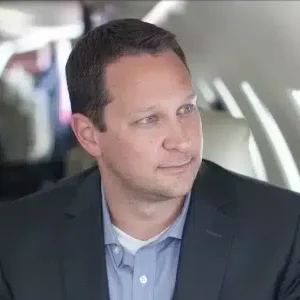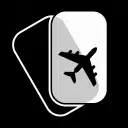Private Jet Pilot: Why Captain Experience Matters
You shake hands with them when you arrive, you might chat idly while in the air, and they give you a wave as you disembark the aircraft at your destination. Private jet pilots are some of the most important people you will meet on your charter flight, and their experience and training are critical to your safety in the air.
What does it take to be a private jet pilot, and how do we weigh experience, training and titles when evaluating the crew assigned to your charter?
Here are the three things to know about private jet pilot experience when you book a flight with Stratos.
1. Take-offs and Landings vs. Total Flight Time
Hours in the air go a long way to ensuring a pilot is well-trained and capable of sitting in the captain’s seat, but there’s more to it than just total flight time.
Long-distance flights in autopilot do provide value and training in decision-making, but take-offs and landings are where a pilot earns their stripes. Why? Every time a pilot flies into and out of an airport, they’re following a detailed checklist, honing their flight planning skills and managing a crew.
Take a turbo-prop pilot, for example. Flights in these smaller aircraft average roughly one hour per trip. A light jet, by contrast, averages over two hours per trip, while flights in heavy jets often last several hours.
So, your Pilatus PC-12 pilot with 300 hours of ‘time-in-type’ experience will have left and landed at airports nearly 300 times, while the Global Express captain with the same number of hours has seen only about 70 take-offs and landings.
That’s why, at Stratos, we recently amended our standards to better reflect a pilot’s experience maneuvering in and around an airport.
2. Required Training for Private Jet Pilots
It’s a common misconception that all pilots can fly all types of aircraft. This isn’t true, and the Federal Aviation Administration (FAA) has varying experience, education and training requirements for each type of pilot.
So, can any pilot fly a private jet? No. Just as a New York State driver’s license doesn’t permit you to haul people around Manhattan in a yellow taxicab, a private pilot certificate doesn’t allow someone to fly a jet charter.
After earning a private pilot license, the FAA requires private jet pilots to have at least 250 hours of flight time before undergoing further testing and working with an instructor to earn logbook endorsements to earn a commercial pilot certificate.
At this stage, many pilots go on to become Certified Flight Instructors to log more hours while also earning their Instrument Flight Rating (IFR). This rating is critical for private jet pilots—it allows them to transport passengers in all types of weather.
With a commercial license, pilots can fly small planes with weight and passenger restrictions.
3. Setting the Standard for Safety
To fly a private jet charter, the FAA mandates that the pilot must have a commercial pilot certificate. At Stratos, however, we require that the pilot-in-command also holds an active Airline Transport Pilot certificate.
Also known as an ATP, this is the highest level of aircraft pilot training in the United States. Before a pilot can take the ATP Practical Test offered by the FAA, they need to have:
- At least 1,500 total hours of flight time
- 500 hours cross-country
- 100 hours flying at night
- 75 hours of instrument flight time in instrument conditions
- 250 hours as the pilot-in-command
- Possess a first-class medical certificate
If the pilot passes the ATP test, they become authorized to act as the pilot-in-command of a scheduled or chartered aircraft with a maximum gross weight of more than 12,500 pounds or having more than nine passenger seats.
At Stratos, we set our standards even higher. To fly with us, the pilot must also have:
- At least 3,000 hours of total flight time with half as the pilot-in-command
- Minimum 250 hours of ‘time in type’ training for the specific aircraft they will fly
Why Do Our Requirements Go Above FAA Recommendations?
We set the bar high because we value your safety above all else.
When a pilot-in-command meets our total hours requirement, we know that they’re dedicated to their profession and have the skills, knowledge and training necessary to provide a remarkable flight.
With their time in type experience, we trust that they know the ins and outs of the aircraft, how it works and why it’s the right jet or turboprop for your mission.
And, with their considerable experience as the pilot-in-command, we have faith in their ability to fly you to your destination safely.
Do Private Jets Need Two Pilots?
Some turboprop planes and light jets are certified for single-pilot operations. However, when you charter a private jet with Stratos, we require two experienced pilots on every aircraft regardless of its certification. By having two private jet pilots, who are often both ATP-certified, we drastically improve the measure of safety aboard every charter we arrange.
So, can a private jet fly solo? Yes, just not with us.
At Stratos, we advocate on your behalf and only put you in the sky with the most experienced crews. When an operator assigns private jet pilots and crew members who don’t meet our high standards, we step in to ensure they earn their stripes on other brokers’ flights.
Ready to book a flight aboard a safe and luxurious aircraft captained by two experienced private jet pilots? Give us a call at (888)593-9066 to learn more.
Are you ready to book your Washington DC and Los Angeles charter flight yet?
Our friendly, expert air charter agents are here to answer questions or start your quote today. Don`t wait, call now and we'll get you on your way to your destination!
Call 888-593-9066











